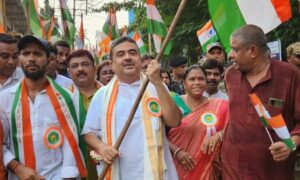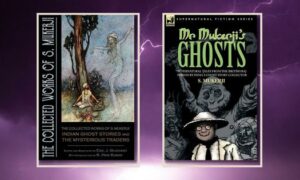
Anthologies play a crucial role in consolidating, interpreting, and promoting literary canons, particularly in postcolonial contexts where cultural production has often been fragmented by political upheaval and linguistic hierarchies. In the New Century: An Anthology of Pakistani Literature in English, compiled and edited by writer Muneeza Shamsie, is one of the most ambitious and significant such projects in the landscape of Pakistani Anglophone letters. As a successor to Shamsie’s earlier compilation, A Dragonfly in the Sun, this volume builds upon decades of scholarship and curatorial engagement, situating itself both as a retrospective of a transformative 20-year period (1997-2017) and as an implicit argument about what Pakistani English literature has become, and where it might yet go.
From genesis to canon
The anthology is prefaced by a meticulously researched introduction that traces the growth of Pakistani English literature from its hesitant beginnings to the dynamic field it represents today. The narrative of this development is framed around two seminal figures, Shahid Suhrawardy and Ahmed Ali, whose mid-century efforts set the groundwork for later generations. Yet it was in the 1960s, Shamsie argues, that the literature began to acquire a truly contemporary voice, largely through the innovations of Zulfikar Ghose, who settled in Britain, and Taufiq Rafat, who remained in Lahore. This duality, diasporic and home-grown, is central to understanding Pakistani writing in English, a field marked by linguistic hybridity, migratory experience, and the contestation of identity.
By the 1980s and 1990s, the community of writers had expanded considerably. Figures like Maki Kureishi, Daud Kamal, Kaleem Omar, and Bapsi Sidhwa contributed significantly to defining the aesthetic and thematic scope of Pakistani Anglophone literature. In particular, Sidhwa’s Ice-Candy Man brought international attention to the violence of Partition while experimenting with multilingual narrative strategies. This was also the period when poets such as Ejaz Rahim, Alamgir Hashmi, and Salman Tarik Kureshi began to cement the primacy of English-language poetry as the dominant genre of Pakistani creative expression.
The arrival of the 21st century coincided with a shift in both the infrastructure and perception of Pakistani writing in English. Publishing opportunities expanded, literary festivals multiplied, and the diaspora grew increasingly influential. Shamsie’s anthology captures this transformation in granular detail, offering a textured snapshot of a literature simultaneously grappling with the burden of history and the challenge of modernity.
It is often remarked that editing an anthology is akin to curating an exhibition. One must decide what to include, what to exclude, and how to contextualise the selections without flattening their individuality. Shamsie has long demonstrated an awareness of this challenge, and in In the New Century, she meets it with both rigour and nuance.
The format of the volume is unpretentious yet methodical. Each writer is introduced succinctly, with biographical details and critical remarks that situate their work within broader literary and historical currents. These introductions are neither hagiographic nor dismissive, but rather carefully measured assessments of style, contribution, and influence. This approach allows readers, whether seasoned academics or newcomers, to appreciate the significance of each author’s work while remaining alert to its place in a larger cultural tapestry.
Importantly, Shamsie’s editorial stance is not that of the gatekeeper zealously defending a rigid canon. Instead, she appears to conceive of Pakistani Anglophone literature as an evolving ecosystem, one in which new voices are as worthy of attention as the established figures. The anthology’s temporal frame (1998–2017) is deliberate rather than arbitrary: it captures the flourishing of Pakistani writing in the years when globalisation, digital media, and political turmoil reshaped literary production and reception.
Diversity in form and subject
One of the anthology’s most striking features is its catholicity of genre. Poetry, fiction, drama, memoir, and life-writing are all represented. This inclusiveness reflects the vibrancy and heterogeneity of Pakistani English literature, which has historically resisted neat compartmentalisation.
The poetry selections reveal both continuity and innovation. Established voices like Imtiaz Dharker, Moniza Alvi, and Alamgir Hashmi appear alongside younger poets such as Rizwan Akhtar, Peerzada Salman, and Raza Ali Hasan. The thematic concerns of these poets range from the trauma of Partition and war to more intimate reflections on loss, belonging, and identity. The inclusion of bilingual and hybrid texts, some of which incorporate Urdu, Punjabi, or Sindhi, signals an increasing comfort among poets with code-switching and linguistic experimentation.
In prose, the volume ranges from the realist narratives of Mohammed Hanif and Kamila Shamsie to the allegorical fiction of Mohsin Hamid. Hanif’s biting satire of political life in A Case of Exploding Mangoes stands in fascinating counterpoint to Hamid’s surreal, migratory worlds in Exit West. Uzma Aslam Khan’s engagement with ecology and gender in Thinner Than Skin, Bina Shah’s evocation of Sindh’s history in A Season for Martyrs, and Nadeem Aslam’s poetic rendering of loss in The Golden Legend illustrate the range of novelistic concerns and techniques.
Equally notable are the selections from creative memoirs and life-writing. Sorayya Khan’s exploration of silence and memory in Noor, Bapsi Sidhwa’s reflection on her novel’s adaptation into film, and Shahbano Bilgrami’s meditations on mourning reveal the power of non-fiction to complement and deepen fictional narratives. These pieces often blur the boundary between personal testimony and literary artifice, offering readers new ways of understanding the relationship between experience and representation.
If there is a single theme that emerges most forcefully across the anthology, it is the question of identity, national, linguistic, cultural, and personal. For Pakistani writers living abroad, the question of where one belongs is often compounded by the pressures of representing a homeland that is itself contested. The diaspora figures prominently in the volume: Hanif Kureishi’s British Asian characters, Ayub Khan Din’s plays about generational conflict, and Rukhsana Ahmad’s theatre exploring the lives of South Asian women all foreground the dislocations and hybridities of migration.
Shamsie herself acknowledges that the distinction between diaspora and “homeland” writers has become increasingly porous. Many authors included in the anthology, Kamila Shamsie, Mohsin Hamid, and Moni Mohsin move fluidly between Pakistan and the West, both physically and imaginatively. Their work resists any reductive notion of “authenticity,” demonstrating instead that Pakistani literature in English is best understood as transnational and polyphonic.
Experimentation and innovation
One of the anthology’s subtler achievements is its demonstration of how Pakistani English literature has embraced formal experimentation. Poets like Hima Raza and Shadab Zeest Hashmi have incorporated the Urdu ghazal, the qasida, and even the Japanese haiku into English compositions. Fiction writers like Mohsin Hamid employ second-person narration and magical realism, while memoirists like Sara Suleri Goodyear weave personal history with philosophical inquiry.
These formal innovations are not mere aesthetic flourishes. They represent deliberate efforts to expand the expressive capacities of English and to challenge inherited literary conventions. In doing so, they also underscore the extent to which Pakistani Anglophone literature has become a site of creative resistance and renewal.
A work of this scale inevitably invites questions about inclusions and omissions. Some readers may feel that certain contemporary voices, particularly those who published after 2017, are missing. Yet Shamsie is transparent in describing the anthology as a retrospective, rather than an up-to-the-minute survey of the field. By delimiting her scope to two decades, she achieves a depth and focus that would have been impossible in a more open-ended project.
Another possible criticism is the preponderance of English-language work, which some might see as perpetuating the elitist connotations of Anglophone literature in Pakistan. However, Shamsie is acutely aware of this tension. Her introduction contextualises the historical debates around language and identity, acknowledging the ambivalence with which English has been received. At the same time, she argues persuasively that English has become a medium of self-expression for writers from diverse backgrounds, not merely an instrument of cultural privilege.
After Tariq Rahman’s landmark A History of Pakistani Literature in English, this anthology represents the most sustained effort to chart the evolution of Pakistani Anglophone writing. Its significance is manifold: it consolidates a dispersed and sometimes neglected body of work, provides a critical framework for understanding its development, and offers a platform for voices that might otherwise remain marginal.
It is also notable that the anthology situates Pakistani literature within broader global conversations about postcolonialism, migration, and cultural hybridity. In this sense, In the New Century serves not only as a national literary record but also as a contribution to comparative studies of world literature.
Looking ahead, the anthology raises important questions about the future direction of Pakistani literature in English. Will the next generation of writers continue to negotiate the legacies of Partition, Islamophobia, and geopolitical conflict, or will new thematic preoccupations emerge? How will digital technologies, climate change, and shifting demographics reshape the literary field? And what new forms, hybrid, multimodal, experimental, might develop to articulate these changing realities?
While no anthology can answer these questions definitively, In the New Century provides the tools and context with which to begin exploring them. It is a capacious, thoughtful, and meticulously assembled work that honours the past without foreclosing the future. For students, scholars, and general readers alike, it will remain an indispensable resource for understanding how Pakistani English literature has become a dynamic and essential part of global literary culture.
Sarita Jenamani is an Austria-based poet, editor of Words and Worlds: An Austrian Bilingual Magazine for Migrant Literature, and General Secretary of PEN Austria.
In the New Century: An Anthology of Pakistani Literature in English, compiled and edited by Muneeza Shamsie, Oxford University Press.
📰 Crime Today News is proudly sponsored by DRYFRUIT & CO – A Brand by eFabby Global LLC
Design & Developed by Yes Mom Hosting






